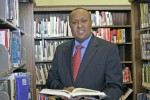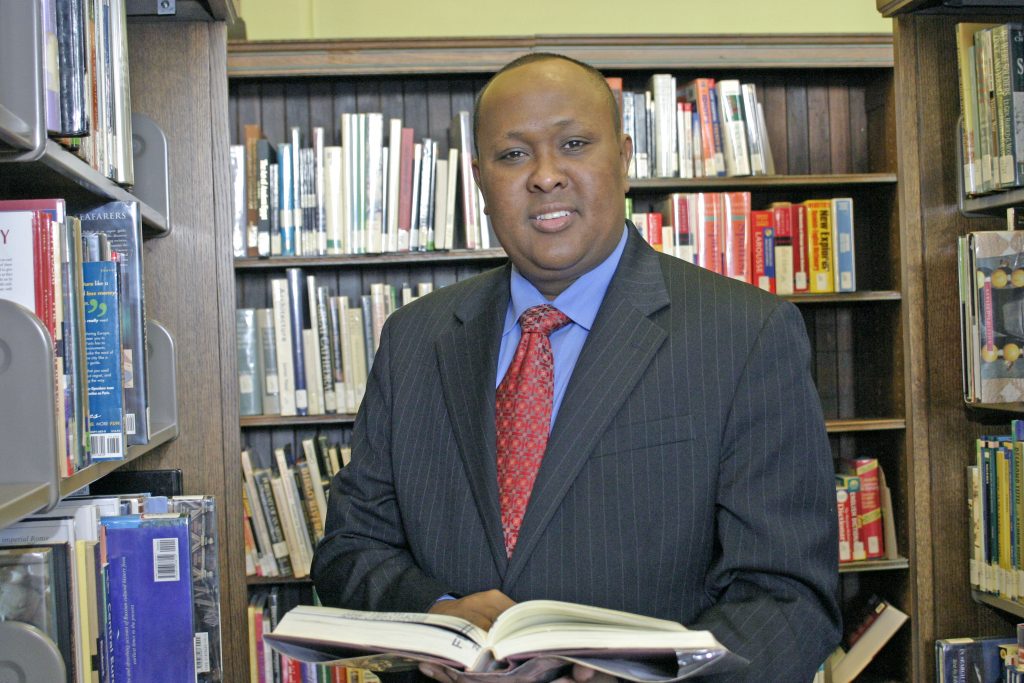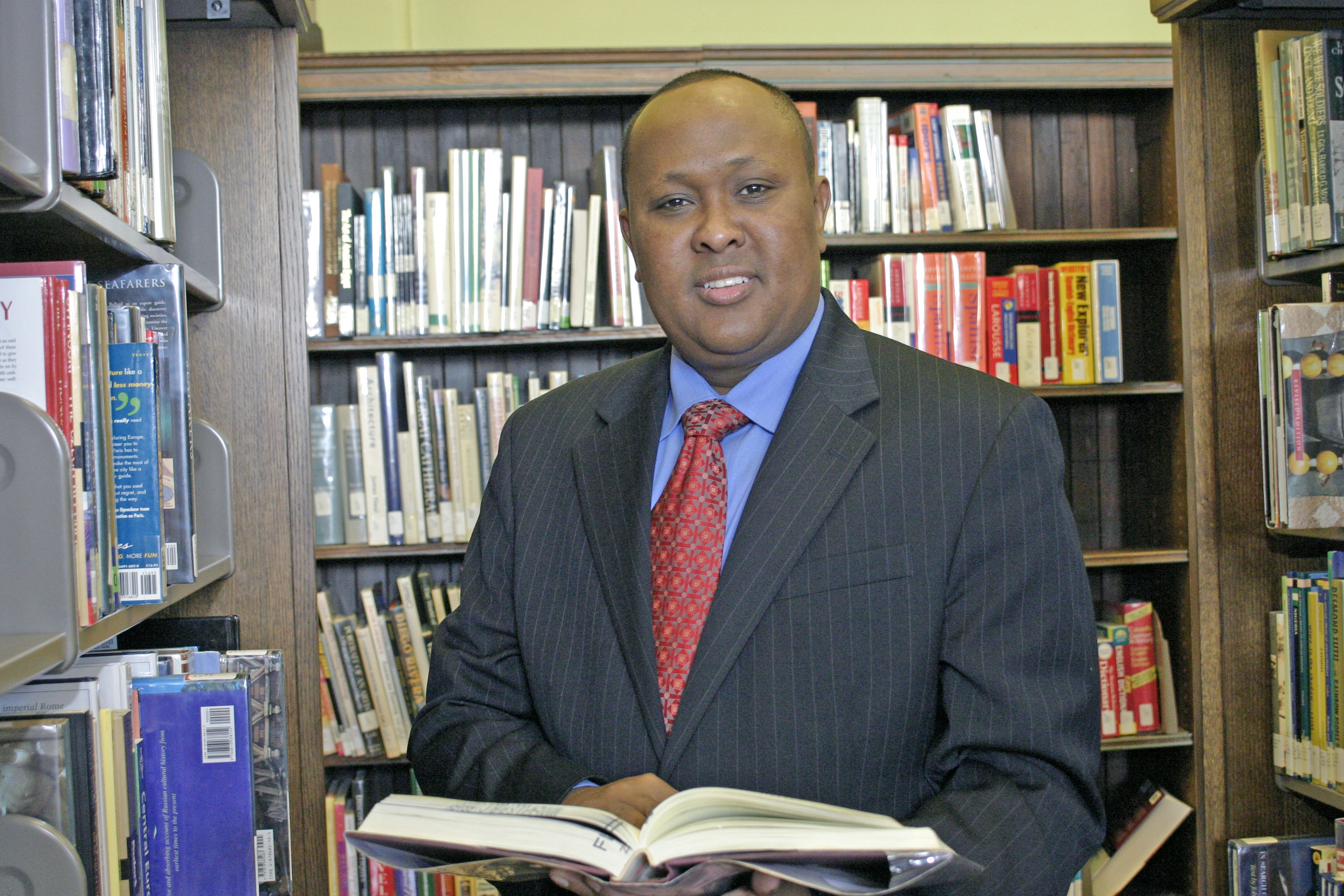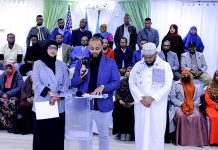

The same day Central Connecticut State University in New Britain released a study ranking Minneapolis as the second most literate city in the country, the newly reelected mayor of that city, RT Rybak, appointed Hussein Samatar, a Somali businessman to the Minneapolis Library board on November 29.
A prepared statement from the mayor’s office said Mr. Samatar becomes one of the highest ranking Somali public officials in the country. Mr. Samatar, wife Ubah Jama and their three children, Hanad, Harun and Habon are regulars at the Franklin Community Library in South Minneapolis . The recently renovated library is part of the Minneapolis library system. A community celebration of the appointment was held at that library on December 5.
The Minneapolis Library System is managed by a Board of Trustees of eight people. Six are elected by residents of the city for four year terms while the mayor and the City Council each appoint one for two year terms. In choosing Mr. Samatar to fill the mayor’s appointee spot, Mr. Rybak said “Appointing Hussein to the Library Board is about bringing new voices to lead our libraries into the future, especially voices from our growing immigrant communities,” and quickly added that Mr. Samatar has shown incredible leadership by helping many entrepreneurs get their start.
Mr. Samatar is the founder and executive director of the African Development Center (ADC) which assists entrepreneurs in the African immigrant community start businesses by assisting them in planning and funding their ventures. Prior to starting the center in 2002, Mr. Samatar worked at Wells Fargo Bank for eight years and was in charge of a $15 million commercial and real state portfolio. It is this background that Mayor Rybak cited as reason for his appointment, saying “will (Mr. Samatar) bring excellent business and financial planning experience to our libraries.”
The Minneapolis Library System has been facing severe challenges in recent years and many are hoping the fresh perspectives from the likes of Mr. Samatar will give new direction for the system. Since 2003 the system’s LGA funding has been cut by almost $3 million while its operating budget between now and 2009 is projected to increase by less than 2% annually according to The Friends of the Minneapolis Public Library, a 501(c) (3) support group founded in 1949. As its operating budget declines, health care costs are projected to go up 20%.
The challenges have taken a toll on the system as it has reduced hours system wide by 35%, cut staff by 25%, including cuts in collections, technology and program and maintenance budgets. The support group contends “today our libraries have some of the worst hours of any major system in ”. Mr. Samatar’s comments to the press after his appointment seemed to sympathize with the support group’s sentiments as his family has felt the effects of the cuts. The Franklin library that his family used to visit every Saturday is now closed on weekends, which has not gone down well with the young family. He said he wants to see longer hours at the libraries and will encourage mayor Rybak to seek more funds.
Speaking in three languages (Somali, English and Spanish) at the community celebration where about 100 people crammed into a small room, Mr. Samatar said he was humbled to be the mayor’s appointee and that his objective as a member of the library board will be to ensure that the libraries have the resources that immigrant communities need and can easily utilize. “I said yes to the Mayor’s call of service because I want to give something back in return for all the great memories that the Minneapolis Public Libraries have given us”, he told an attentive audience.
He said that being an immigrant has always inspired him to help immigrants but he is keenly aware that as a member of the library board he represents the entire Twin Cities population and looks forward to the challenge. He preceded his remarks by reminding people of Nellie Stone Johnson, the first black person elected to citywide office in Minneapolis when she won a seat on the Library Board on June 12, 1945 and how the Minneapolis paper described her as echoing Franklin Roosevelt’s definition of “Books are weapon of democracy”.
Also speaking at the community celebration that was attended by various civic and community leaders including Minneapolis Police Chief, William McManus, was excited Mayor RT Rybak who said he also looks forward to having the option of voting for a Somali in a citywide election. Laura Waterman Wittstock, the previous appointee of the mayor was also present at the community celebration. Mayor Rybak noted with satisfaction that she successfully ran in the just concluded November elections and got elected to the board on “her own right”.
Sheikh Saad Musse, the Imam at the Tawheed Center in Minneapolis and a good friend to Mr. Samatar told Mshale this was a positive development for not just the Somali community but all immigrants and that he was personally excited. Muna, a 14 year old student at Anne Sullivan Middle School and a frequent user of the Franklin library said he doesn’t know Mr. Samatar personally but is aware of his good standing in the community as her family talks positively about his work and “I know he will make good decisions for all”, she said. Sally Munger, who is the head librarian at Franklin , said she has known Mr. Samatar since 1995 and there is no question this was a good choice by the mayor.
Mr. Samatar arrived in Minnesota in 1994 with a degree in economics from Somali National University . Soon after arriving in Minnesota, he enrolled at the University of St. Thomas where he obtained his MBA. He is a 2003-2004 public policy fellow at the University of Minnesota ’s Humphrey Institute of Public Affairs.
Founded in 1885, the Minneapolis Public Library system provides service through the downtown Central Library which is under reconstruction, fourteen community libraries, a bookmobile, a literacy center, two technology centers, and its website that the system describes as a “library without walls” offering visitors 24/7 access to information.
The Central Library will reopen in Spring 2006 and according to library construction updates provided by the system, “The New Central Library will be home to an outstanding collection, the largest of any public library in Minnesota .” The new library will also feature a new immigrant center. The downtown Minneapolis Central Library was designed by Cesar Pelli, architect of the Petronas Towers in Kuala Lumpur, which was until 2004 the tallest building in the world as well Manhattan’s World Financial Center .
The Minneapolis Library’s 2005 operating budget was $21 million with 61% of its revenue coming from a city tax levy and 33% coming from the state via Local Government Aid (LGA).
About Tom Gitaa Gitaa, Editor-in-Chief
Born and raised in Kenya's coastal city of Mombasa, Tom is the Founder, Editor-in-Chief and Publisher of Mshale which has been reporting on the news and culture of African immigrants in the United States since 1995. He has a BA in Business from Metro State University and a Public Leadership Credential from Harvard’s Kennedy School of Government. He was the original host of Talking Drum, the signature current affairs show on the African Broadcasting Network (ABN-America), which was available nationwide in the United States via the Dish Network satellite service. On the show, he interviewed Nobel laureates such as 2004 Nobel Peace prize winner, Professor Wangari Maathai, the first woman from Africa to win the peace prize and heads of states. Tom has served and chaired various boards including Global Minnesota (formerly Minnesota International Center), the sixth largest World Affairs Council in the United States. He has previously served as the first Black President of the Board of Directors at Books for Africa. He also serves on the boards of New Vision Foundation and the Minnesota Multicultural Media Consortium. He has previously served two terms on the board of the United Nations Association. An avid runner, he retired from running full marathons after turning 50 and now only focuses on training for half marathons.
- Web |
- More Posts(431)







